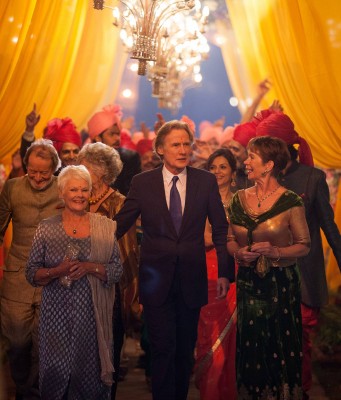
In 2011, director John Madden and screenwriter Ol Parker adapted a novel by Deborah Moggach about white British retirees moving to a less-than-luxurious hotel in India. The result was “The Best Exotic Marigold Hotel,” a Golden-Globe nominated tale of old dogs learning new tricks. That is to say, elderly Brits acclimating to life within a new culture.
In a scene from that film, Sonny (Dev Patel), the young, ambitious owner of the hotel-in-progress, comforts a disgruntled customer with a witticism: “Everything will be all right in the end. If it is not all right, it is not yet the end.” By this logic, when everything is all right at the conclusion of “The Best Exotic Marigold Hotel,” the story should have ended. That Madden and Parker thought it best to open “The Second Best Exotic Marigold Hotel” suggests that not all might be so right.
A lot of the jokes in the film focus on the age of the hotel’s residents. They are old, and death is just around the corner. But life’s end, the movie shows, is full of beginnings.
The original film’s cast of main characters is back with potential for new lives: Evelyn (Judi Dench) has been offered a job negotiating with textile manufacturers for a private company, nursing a budding romance with Douglas (Bill Nighy). Douglas is much happier now that his wife (Penelope Wilton) has left him. He works as a tour guide, despite his failing memory. Madge (Celia Imrie) has her pick of two wealthy suitors and Norman (Ronald Pickup) and Carol (Diana Hardcastle) are attempting to navigate the ups and downs of their new relationship. Love is in the air as well for Sonny and his fiancée, Sunaina (Tina Desai), around whose wedding the film is structured.
Yet more prevalent in Sonny’s mind than the wedding — much to Sunaina’s chagrin — is his and Mrs. Donnelly’s (Maggie Smith) plan to expand the hotel. After they travel to the United States to discuss the plan with a hotel chain for the elderly, the head of the company (David Strathairn) says he’ll send his “best guy” as an undercover hotel inspector. When Guy Chambers (Richard Gere) arrives on the scene, Sonny assumes he’s the “guy” inspecting his hotel, despite the suspicious behavior of the hotel’s other new guest, Lavinia Beach (Tamsin Greig).
In the shuffle, Sonny loses sight of the woman he loves in his business ambitions. Worse, Mrs. Donnelly, his go-to source for honest advice, is being cryptic and distant after a mysterious visit to the doctor. Mrs. Donnelly’s ominous behavior, much like her frank and borderline rude commentary, brings a harsh dose of reality to the otherwise lighthearted and fantastical feel of the film.
But this is as deep as the film’s narrative gets. Though so full of sub-plots as to never be boring, there is no huge drama in the film. Though the lavish wedding ceremony certainly carries both the tradition of an ancient culture and the new influence of Bollywood, none of the racism and culture clash found in the original film carry on into the sequel.
Yet that’s not necessarily a bad thing. With a box office dominated by explosions and raunch, many older filmgoers can be faced with a choice of depressing biopics or even more depressing art-house films. The movies are no place for retirees looking for a relatable laugh, but with “Marigold,” they can have one, or many.
Indeed, it’s hard not to laugh at the infectious happiness of the entire film. Every actor is pitch-perfect, each character more charming than the last. Dev Patel as the charismatic and surprisingly witty (if foolish) Sonny, and Bill Nighy as the bumbling, harmless Douglas stand out among the men. Dench is heartbreakingly kind as Evelyn and Smith, an audience favorite thanks to her similarly strong-willed character on “Downton Abbey,” is wonderfully blunt as Mrs. Donnelly.
Though the hotel residents are approaching the end of their lives, “The Second Best Exotic Marigold Hotel” is about progression toward new life, not death — progress and optimism, even in the face of the biggest obstacle of all: human mortality. The plot may not be surprising or revolutionary, but it doesn’t seek to be so. Rather, it encourages us to make our short time on Earth as happy as we can, even perhaps by forgetting the inevitable end of it for a few hours while we watch a feel-good movie.



















































































































